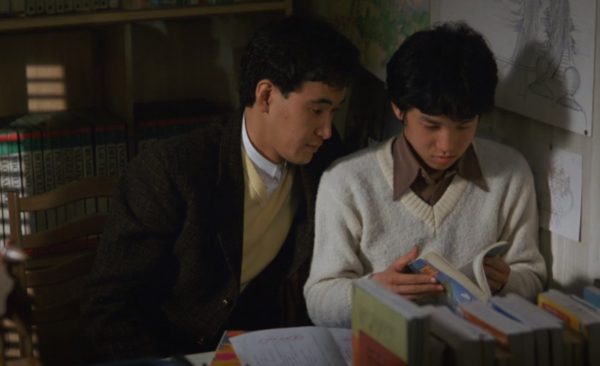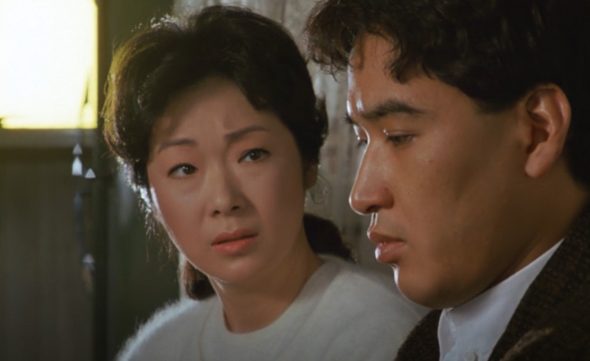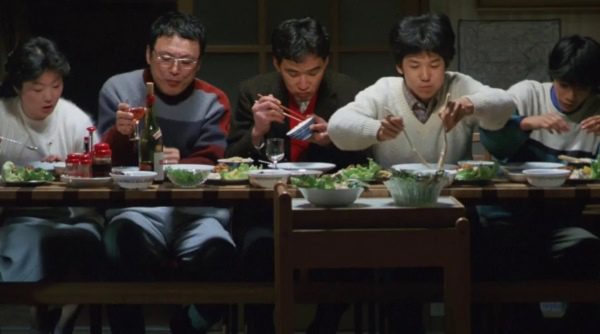Japanese humour often means a satire, or a situational comedy that pokes fun at human shortcomings, and The Family Game (1983) is a perfect example of humorous Japanese entertainment full of “shocks”, dark topics handled lightly and deadpan deliveries. On the receiving end of the critique is one of Japan’s most sacred institutions—a nuclear family, and this fifth film by Yoshimitsu Morita already feels like an accomplished cinematic feat, something which undoubtedly felt a bit far off for his feature debut Something Like It, made only two years previously.
The characters in this comedy of manners are part of a stereotypical family (Numata) living in Japan, consisting of: father Kōsuke (Juzo Itami), the family patriarch and salary-man; dutiful, but often clueless mother Chikako (Saori Yuki); diligent, but increasingly apathetic older son Shinichi (Jun’ichi Tsujita); and troubled younger son Shigeyuki (Ichirōta Miyagawa).
The nature of their co-existence and inter-relationship is invariably tied to certain societal expectations placed on them, as well as dictated by roles they took on simply as a result of being born in a hierarchy-minded society. Mr Numata cares only about the prestige and financial future of his family, Mrs Numata cares about pleasing Mr Numata, Shinichi seemingly cares about one girl from his class he starts “dating”, and his brother Shigeyuki cares about…well, his roller-coaster model, probably (he is passionate about roller-coasters).
When Shigeyuki’s grades at school continue to get worse, no one is really concerned about the immediate problem of what is really going on with Shigeyuki and his mental state. They simply want to “fix” the problem of his grades as a way to please each other, avoid conflict and meet the expectations placed on them by Mr Numata.

The youngest son listens to the oldest, the oldest and the youngest listen to their mother, and all obey the father. It is a game of “keeping up appearances” where the only winner is the society’s continual “acceptance” of this family since it continues to be so very ordinary. It seems no one truly wants for Shigeyuki’s grades to improve, and it is only the expectation dictates that they should.
Then, the “disruptor”, the so-called “fifth element” comes to the scene—a private tutor named Yoshimoto (Yūsaku Matsuda), hired by the father to help Shigeyuki with his grades at school as he ranks 9th from the bottom in his class. It is both fitting and ironic that this role of the person who creates chaos in the Numata household should be played by the “bad boy” of Japanese cinema— Yūsaku Matsuda.
And, the situation of a stranger arriving and “infiltrating” one well-to-do family, establishing his own sense of “order” there, is not unlike that we saw in Pasolini’s Theorem or in Bong’s Parasite. However, the outcome in The Family Game is subtler. Yoshimoto’s tutoring shocks and mystifies, and these scenes, together with the lunch/dinner sequences, are the most illuminating in the film. The point here is that even the tutor himself is not really interested in Shigeyuki or his studies. He is after his monetary compensation, and also probably the feeling of power and superiority exercised over weak and submissive Shigeyuki.
The Family Game reflects the reversal of ideals in Japan in the 1980s when the country experienced an economic boom. It generally became a norm in the result-oriented society to accept a vision of reality that reflects one’s ideals only superficially and from the point of view of an outsider. Thus, “fictitious” roles are created to serve this purpose, since the aim is no longer the achievement of truth, but its semblance.
The father in the Numata family is “defined” by his job, the mother is “defined” by her obedience to her husband, and the sons are “defined” by their school grades. Their relationships with each other are so tied up to their roles and social expectations that the father and mother can only “shed” those roles and speak frankly (and without being overheard) when they get into their car parked outside their home.

One’s school grades in Japan are important since they determine one’s high school, which, in turn, determines one’s university, which, in turn, determines one’s whole career, but there is also a price to pay for this order of priorities, and the film satirises the expectations placed on Shigeyuki. He is a “silent hero” whose passion (for roller-coasters), will (to choose his school), and even personality “die” to please those higher in the hierarchy than him (be it his school bully, his tutor or his father). Even his temporary escape to fiction and manga is short-lived. “What is your hobby?”, asks Shigeyuki. “Mine?”, answers tutor Yoshimoto, “to teach someone to learn, [and] what is your hobby?” “To learn”, answers the boy. These are the answers demanded by the roles they took on.
As its story, the film adopts a rather tongue-in-cheek presentation approach: flamboyant, colourful cinematography and the diversity of shots all remind of a number of other similar satirical comedies released in the 1980s and 1990s, especially The Funeral and Supermarket Woman (both directed by Juzo Itami, the man who plays the father in The Family Game). Numata family members’ artificially-crafted roles are emphasised by the actors’ slightly robotic acting. Every frame is interesting because of what it either shows or implies. From inexplicable overhead shots of pristine green lawns of Shigeyuki’s school to the five facing chairs’ dinner-ensemble sequences and Mr Numata’s peculiar way of eating an egg by “sucking it out” from the plate – everything is bathed in awkwardness in The Family Game, and yet, as in Yorgos Lanthimos’s films, everything also inexplicably works.

The final scenes hint at apathy, aimlessness or meaningless that yet again descends on the Numata family. Even after being “shaken back to the reality” by Yoshimota, nothing really changed for this family. The wider society continues to ensure that nothing ever does.
Historian Barbara Tuchman once said that a satire is a wrapping of exaggeration around a core of reality. The Family Game, which is based on Yohei Honma’s novel, is exactly that. The film, like any good satire, will both shock and make its audience smile, satirising many aspects of the modern Japanese society, from “tiger parents” to table manners. This is a fun, but also brainy film for those willing to go that extra mental mile to understand its undercurrents.



